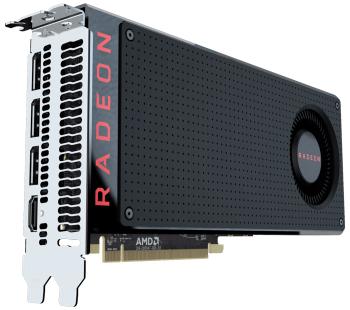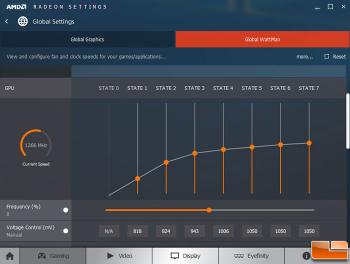AMD has emailed HEXUS to say that it has a solution to concerns over the Radeon RX 480 drawing excessive current from the PCIe bus. In a nutshell, it will be providing a new driver, AMD Radeon Software 16.7.1, which will address power distribution, within the next 48 hours. The driver will provide additional benefits to end users including an option to reduce total power consumption, and performance improvements of up to 3 per cent in several popular games titles.
As noted in the previous news story today, on the topic of AMD Radeon RX 480 4GB BIOS update enabling 8GB, we had been told that we would hear about the RX 480 PCI-e power draw issues yesterday. While I was waiting for the news it was interesting to read Legit Reviews' AMD Radeon RX 480 Undervolting Performance review. That review tested lower voltages on the RX 480 and found that many games performed better with an undervolted card. Typically a lower voltage tweak in WattMan meant that full boost speed could be maintained much longer so no throttling occurred. Also a power consumption reduction of 10-20 watts was observed with cooler operation. Undervolting sounds like a win-win strategy on the stock cooler equipped RX 480 card. It sounds like similar techniques could be implemented in the upcoming driver.
So that you have all the official information let's look back at AMD's original statement regarding PCI-e over-current issues, which we received on Saturday:
"As you know, we continuously tune our GPUs in order to maximize their performance within their given power envelopes and the speed of the memory interface, which in this case is an unprecedented 8Gbps for GDDR5. Recently, we identified select scenarios where the tuning of some RX 480 boards was not optimal. Fortunately, we can adjust the GPU's tuning via software in order to resolve this issue. We are already testing a driver that implements a fix, and we will provide an update to the community on our progress on Tuesday (July 5, 2016)."
So what exactly has AMD got planned for Radeon Software 16.7.1? In addition to the summary, in the intro paragraph, I am providing AMD's full official statement below, including footnotes, to make sure nothing is overlooked:
We promised an update today (July 5, 2016) following concerns around the Radeon™ RX 480 drawing excess current from the PCIe bus. Although we are confident that the levels of reported power draws by the Radeon RX 480 do not pose a risk of damage to motherboards or other PC components based on expected usage, we are serious about addressing this topic and allaying outstanding concerns. Towards that end, we assembled a worldwide team this past weekend to investigate and develop a driver update to improve the power draw. We’re pleased to report that this driver—Radeon Software 16.7.1—is now undergoing final testing and will be released to the public in the next 48 hours.
In this driver we’ve implemented a change to address power distribution on the Radeon RX 480 – this change will lower current drawn from the PCIe bus.
Separately, we’ve also included an option to reduce total power with minimal performance impact. Users will find this as the “compatibility” UI toggle in the Global Settings menu of Radeon Settings. This toggle is “off” by default.
Finally, we’ve implemented a collection of performance improvements for the Polaris architecture that yield performance uplifts in popular game titles of up to 3%1. These optimizations are designed to improve the performance of the Radeon RX 480, and should substantially offset the performance impact for users who choose to activate the “compatibility” toggle.
AMD is committed to delivering high quality and high performance products, and we’ll continue to provide users with more control over their product’s performance and efficiency. We appreciate all the feedback so far, and we’ll continue to bring further performance and performance/W optimizations to the Radeon RX 480.
1: Based on data running ’Total War: Warhammer’, ultra settings, 1080p resolution. Radeon Software 16.6.2 74.2FPS vs Radeon Software 16.7.1 78.3FPS; Metro Last Light, very high settings, 1080p resolution, 80.9FPS vs 82.7 FPS. Witcher 3, Ultra settings, 1440p, 31.5FPS vs 32.5, Far Cry 4, ultra settings, 1440p, 54.65FPS vs 56.38FPS, 3DMark11 Extreme, 22.8 vs 23.7 System config: Core i7-5960X, 16GB DDR4-2666MHz, Gigabyte X99-UD4, Windows 10 64-bit. Performance figures are not average, may vary from run-to-run.








